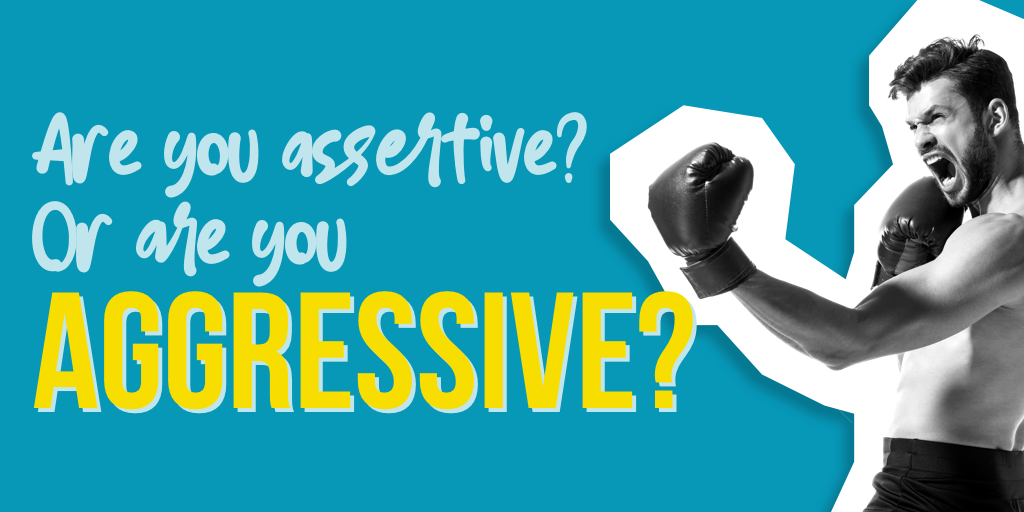And you CAN be both, of course. At different times, in different situations, with different people.
But have you ever thought about the difference?
What is that fine line?
Well, first let me say that in many cases, the line is not going to be hard and fast. Because humans are varied, and there is no one litmus test that will work for all. What one person loves and feels is assertive (or Domly-dom) another will find repulsive and over-the-top aggressive.
AND THAT’S OK.
Not everyone is going to be a personality match.
Also, how someone was raised, the culture they come from will make a difference.
So, let’s look at definitions:
assertive, adj.
confident in behavior or style
aggressive, adj.
ready and willing to fight, argue, etc. : feeling or showing aggression
using forceful methods to succeed or to do something
marked by obtrusive energy and self-assertiveness
I think assertive is pretty easy to understand. And the first definition there of aggressive is recognizable. I mean, if you’re ready and wiling to fight or argue, then you probably know it.
But that’s not the line we’re talking about when we’re trying to nail down why something that is not overtly violent or argumentative feels aggressive.
And when someone has been accused of being aggressive, and they were not at all interested in fighting or arguing, it can leave them flummoxed, and even the accuser at a loss to explain.
So, the other two definitions come into play.
But even so, “forceful methods,” what ARE those? Obtrusive energy? Why can’t we just speak in plain English here?
Ok. Can do.
Assertive is being able to show confidence in yourself and advocate for what you want, while aggression is when you include others without their consent or when your relationship does not allow for that familiarity. (Thanks to @Bearded_piper for the foundation inspiration for this statement.)
Assertive respects the other person and gives them space to be and respond. Aggressive makes an assumption and takes liberties, and tries to reduce (by force) the number of possible replies.
Assertive behavior is respectful of boundaries, clearly delineating where you end and another person begins. Aggressive behavior ignores boundaries, and tries to control others, even if only through suggestion.
And the best way, in my mind to explain this is to give examples, from my own inbox from the past week. All of the aggressive options are real, and are coming from total strangers. I’ve translated them as assertive (and potentially welcomed messages):
Assertive: I find you interesting and would love to connect with you.
Aggressive: You should have lunch with me.
I should what? Who are you to say what I should or should not do? You don’t know me, and you have no negotiated rights to tell me what you think I should do.
Assertive: I’m looking for X, Y and Z, and would love to connect if you’re interested.
Aggressive: I want to be your toilet slave.
In this, there is a level of intimacy implied and cavalierly assumed. And the focus on what they want without even a nod to what I might want is aggressive and frankly, all-too-common.
Assertive: I’m available on Wed between 3-5pm and Thursday between noon and 7pm.
Aggressive: If you don’t want to miss out, you’ll make time for me.
This is grandiose and over-the-top. It suggests someone who feels a need to move things along way too fast, and is willing to manufacture pressure to force another’s hand.
Something to note here, is that assertive is usually the more vulnerable way of speaking. It is very “I” focused, and allows for rejection/negative response as easily as acceptance/positive response.
And that is why so many people—people who aren’t even normally what you might consider aggressive people in the “ready and willing to fight, argue” way are often aggressive in their speech patterns, or in certain situations where it’s unwarranted and unwelcome.
Because they are afraid of rejection. Of being vulnerable.
Let’s look at my first example again with a few additions and notes, including non-personal examples of business use, to make things clearer:
Assertive: I find you interesting and would love to connect with you.
Aggressive: We should have lunch.
Very Aggressive: You should have lunch with me.
“I find you interesting and would love to connect with you,” is oriented around the self, while ALSO acknowledging that the other person has agency. It does not assume connection or familiarity.
This is perfect for strangers expressing an interest, business colleagues, and casual acquaintances.
“We should have lunch,” is more familiar. This assumes that you have enough history together to be able to know that having lunch will end in a positive result, and that you both should do it, for good things to happen.
In a business situation, this is best used in a conversation where discussion has already moved to having further discussion AND the circumstances would not seem weird to make for a more casual lunch meeting, rather than a formal business appointment.
“You should have lunch with me,” is practically a command. It is leaving very little room for a polite demurral, instead almost requiring a hard rejection (which is difficult for many). It’s putting the receiver in the vulnerable position, while claiming power for the person making the statement.
In a business situation, this is clearly a superior speaking to someone who has less power (in at least one area), and there is subtle threat in the language.
And while many people associate aggressive behavior with masculine-presenting folks, let me state clearly: they do not hold the exclusive rights.
MANY people are aggressive.
Declarative, assumptive statements are aggressive as well:
- You should…
- Of course we will… (assumes that you BOTH will)
- When we do XYZ… (assumes that you will do XYZ)
Even questions. “When will you ask me out?” Can be aggressive, and assume that the asking out is a done-deal.
So, when is aggression not just OK, but desirable?
When it’s a negotiated part of a relationship, or appropriate to the level of intimacy.
However, if you don’t know for sure, it’s usually best to fall back on assertive. It’s not only safe, it’s incredibly attractive to most people, because it shows confidence not only in yourself (and your ability to be vulnerable and open to any results), but in the situation.
When you have an aggression problem…
If people tell you that you’re “too direct,” that your words cross their boundaries, that you have violated their consent, or you find yourself getting ghosted often in conversations.
You might be aggressive in your communication.
Do you have to do anything about it?
No, of course not. You’re an adult, and you can do what you want.
However, you might want to consider if this is the case, because you could be turning people off by using aggressive language that you don’t actually mean.
And that is kind of the suck.
What are your thoughts?
How do you feel when someone is aggressive towards you outside of the appropriate relationship? Do you get aggressive in return? Do you shut down? Do you feel like speaking up makes YOU vulnerable and impolite?
Have you been aggressive towards others unintentionally? How so?








